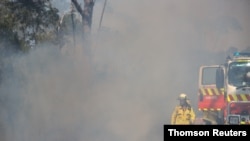Pregnant women living in bushfire-prone areas in Australia are being urged to protect themselves and their unborn babies from smoke as the fire season returns. Doctors in the worst-affected regions say they are horrified by the effects of the smoke from last summer's catastrophic conditions.
Doctors have said particles from bushfire smoke in Australia have left placentas that nourish an unborn child resembling those in women who are heavy smokers. Instead of being a healthy shade of pink, distressed organs are left grey and grainy.
The result can be premature and underweight babies. One specialist said some were “unexpectedly and unpredictably small.”
There’s a warning that newborns could suffer the consequences throughout their entire lives.
General practitioner Rebecca McGowan said she believes global warming is exacerbating Australia’s bushfire danger and that babies are at risk of harm.
“This is the canary in the coal mine,” she said. “We are starting to see literally the effects. It is not a sci-fi movie. This is happening in real life. We are starting to see the effects on the unborn, and we are starting to see these babies born now with major effects of climate change and we cannot deny it anymore. It is happening in front of us.”
There is not a large amount of scientific knowledge on the long-term effects of bushfire smoke on pregnant women. Some experts have suggested that stress could also lead to premature births and smaller newborns. Australian health authorities have said there was no data or evidence to gauge the risk to babies in the womb. They do acknowledge, however, that smoke can aggravate existing lung and heart conditions in adults.
A government inquiry into the Black Summer fires was told that the smoke they generated has been linked to the deaths of more than 445 people. It was estimated that 4,000 people were admitted to the hospital due to the smoke.
Air quality in Sydney, Australia's largest city, exceeded "hazardous" levels on several occasions. Other major cities, including the capital, Canberra, and Adelaide, were also shrouded in a toxic haze.
Bushfire smoke is made up of very small particles and gases. Environmental groups have said it also contains cancer-causing substances, including formaldehyde and benzene.




